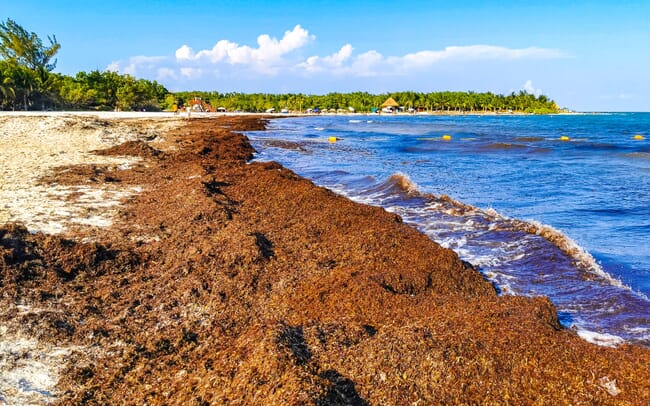
© Shutterstock
Florida-based biotech company Ecological Laboratories utilises a shelf-stable bacterial consortium – mainly Rhodopseudomonas and Wolinella bacteria – to significantly reduce the unpleasant odour and enhance the composting process of Sargassum seaweed. This innovative solution promises to mitigate the impact of Sargassum, which is notorious for accumulating in large quantities along coastlines, resulting in unpleasant odours and environmental concerns.
Extensive research has revealed the potential of Rhodopseudomonas and Wolinella bacteria in mitigating odours through biodegradation. When used together in a mixed culture, the effectiveness of these bacterial species efficiently reduces the odour associated with decomposing Sargassum while optimising the composting process. Their unique ability to break down complex organic compounds – abundant in Sargassum – into simpler compounds facilitates subsequent decomposition by other bacteria and fungi. As a result, the composting process is expedited, and the nutrient content of the resulting compost is enhanced.
"The utilisation of Rhodopseudomonas and Wolinella bacteria in the composting process of Sargassum seaweed represents an advancement in waste reduction and soil improvement, while simultaneously addressing the issue of unpleasant odour associated with Sargassum accumulation," explained Nick Favret, CEO of Ecological Laboratories, in a press release. "This solution holds tremendous potential for implementation along Florida beaches, where Sargassum seaweed poses a prevalent issue, benefiting the environment and the local community."
Upon detecting odour-causing compounds, Rhodopseudomonas and Wolinella bacteria employ enzymes to break down the organic molecules into simpler, less odorous substances. As the bacterium metabolises the odour-causing compounds, their concentration decreases, leading to a reduction or elimination of the odour.
When used together, Ecological Laboratories’ MICROBE-LIFT/PBL and MICROBE-LIFT/SA, which contain Rhodopseudomonas and Wolinella bacteria with other bacterial species, form a natural, salt-tolerant, and non-GMO shelf-stable probiotic formulation. This formulation has been successful in 30 countries addressing a variety of nutrient and water cleanup issues without resorting to chemical treatment.



